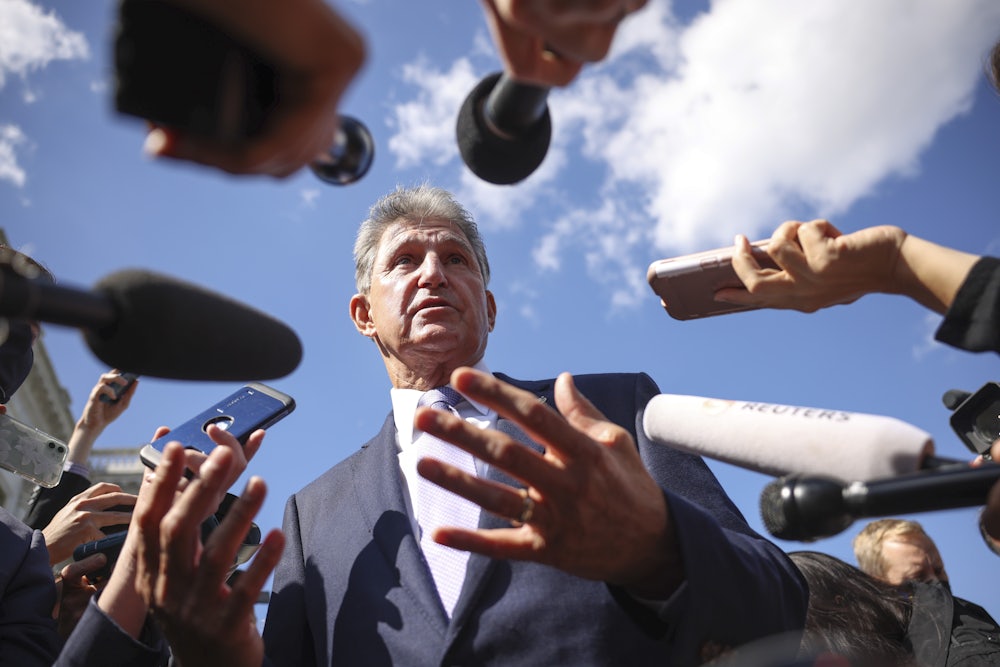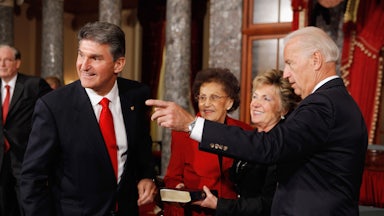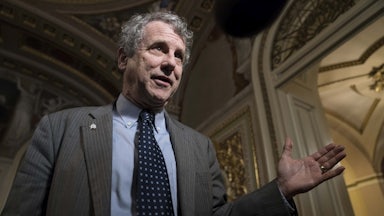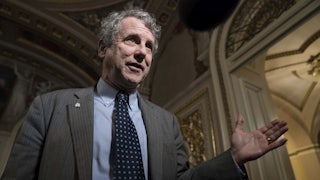In his July memorandum of demands for a reconciliation bill, Senator Joe Manchin—yes, him again—called for provisions related to families and health to be “needs based with means testing guardrails/formulas on new spending.” The proposal, obtained by Politico, also sets $1.5 trillion as a top line, significantly less than the $3.5 trillion currently sought by progressives.
There are many chestnuts in the memo that are sure to frustrate his Democratic colleagues, particularly since he had not previously publicly announced a top-line number. But Manchin has not been silent about his belief that means testing should be included in the bill. (The proposal was signed by Senate Majority Leader Chuck Schumer, who wrote at the bottom of the agreement that he would “try to dissuade Joe on many of these.”)
“Means testing” is one of those inaccessible phrases common among politicians, but its usage obscures its, ahem, meaning. It’s basically a method to determine whether someone is eligible for a benefit; Medicaid and food stamps are good examples of means testing in practice. In the lawmaker lingo, means testing provides a way to shave down the costs of an investment. Instead of spending more money for a universal benefit, the government can target who receives certain benefits.
Democrats want to include a host of social programs in the reconciliation bill, including the expanded child tax credit, universal pre-kindergarten, free community college, and expanded Medicare benefits and Medicaid coverage. But in remarks on Thursday after the Politico report was published, Manchin argued against offering too many benefits, saying that means testing would more effectively target individuals such that “some can pay, some can pay a little bit, some can’t pay any.”
“I say means testing, I say work requirements, those are all very, very important in these things,” Manchin told reporters. (Work requirements for social benefits have a mixed record, and often do more to punish low-income Americans who are unemployed than help them.)
Manchin, considered the most conservative Democrat in the caucus, then sounded a note that seemed more in line with the Republican ethos: “I cannot accept our economy or basically our society moving toward an entitlement mentality,” he said.
Proponents of means testing argue that it ensures the people who receive a benefit are the ones who need it the most. However, progressives note that means testing creates more hurdles for the families who do need the benefits, such as regularly having to fill out paperwork or jumping through other bureaucratic hoops. It also means that people who do not fill out the correct form don’t receive the benefit, even if they qualify. (Research has also shown that the stigma related to means-tested programs can discourage people from participating.)
But even with the method’s faults in mind, means testing is already a feature of many of the provisions Democrats hope to include in the bill. For example, the expanded child tax credit already determines eligibility by income. People earning under a certain threshold receive the full credit—$3,600 for children under 6 and $3,000 for children ages 6 through 17, distributed on a monthly basis—phasing out as income increases.
“The child tax credit does have means testing,” said Senator Elizabeth Warren, when asked this week what she thought of Manchin’s idea that the credit, and other proposed programs, should be means tested. “I’m not sure which program you’re referring to, because I think all of them do.”
Manchin may mean that he believes the income thresholds for these programs should be lowered. A particular target of Manchin’s frustration has been the child tax credit, which begins phasing out at a relatively high threshold, such that two-earner households making $400,000 still receive $2,000 per child.
“I have got people that are making combined 200 and 300 and more, up to 400 [thousand], saying they’re getting checks,” Manchin complained about the child tax credit earlier this month.
Ironically, lowering the threshold for the child tax credit may act as a work disincentive. Because the phaseout for the tax credit is so high, parents still receive a significant amount even if their income increases. But lowering the income threshold, or cutting the amount a person receives, could discourage people from advancing at work because it means they’ll lose their credit or see it significantly decrease.
“You could imagine shaving that down, it’s saving some money. But ... there’s always going to be those trade-offs between those work incentive aspects, and then the costs,” said Diane Whitmore Schanzenbach, the director of the Institute for Policy Research at Northwestern University, who helped spearhead a letter signed by more than 400 economists advocating for an extension of the expanded child tax credit last month.* “Whenever you phase out and get rid of a program, certainly how rapidly you do that matters a lot for work incentives.”
Lowering the threshold too dramatically could also threaten to create a “cliff,” the sudden decrease in multiple benefits that comes with a small change in income. If the child tax credit starts phasing out significantly at the same income threshold as other benefits, that could further disincentivize people from trying to move into a better-paying job.
“Something that’s been nice about the way that the child tax credit is set up is that that phaseout happens really far away from other phaseouts,” Schanzenbach said.
Megan Curran, the director of policy at the Center on Poverty and Social Policy at Columbia University, said that the expansion of the child tax credit for children in the lowest-income families need not preclude giving it to middle- and higher-income children as well.
“The answer to continue ensuring this is not to yank it away from the kids who used to have it,” Curran said. “Children don’t have control over their family circumstances, and certainly not their family earnings levels. And so it just doesn’t make sense in terms of what this program is meant to be to tie it to things that children have no control over.”
There is also some evidence that the child tax credit doesn’t just help cut child poverty and decrease food insecurity but can aid middle-income children, as well. A cost-benefit analysis by Columbia published in August found that the expanded child tax credit would benefit children across the income distribution, although it would be most helpful for low-income families. Curran said that families with moderate incomes might feel “a real loss” if they were excluded from the benefit, because “they have come to rely on it in their own way.” Moreover, it would reduce the sense among parents across income levels that the child tax credit is a necessary and universal benefit, instead potentially stigmatizing it as yet another welfare benefit.
Another potential area for further means testing is the electric vehicle credit. The current credit of up to $7,500 is available for Americans earning up to $400,000, but there has been some discussion of lowering the income threshold to $100,000. Democratic Representative Dan Kildee, who has proposed an additional $4,500 credit for union-made electric vehicles and a further $500 if using a battery made in the United States, argued that means testing was already included in the bill.
“This iteration of the bill that we wrote has not only [an] income means test but also has a vehicle price means test, so there is some of that built in,” Kildee told reporters in response to a question by The New Republic on Thursday. “Even with other elements, there are means tests built in. There may be differences about where the thresholds ought to be, I get that.”
But Manchin has not just targeted the proposed programs that already include means testing. He has also suggested that some of the programs intended to be available to all Americans, like universal pre-kindergarten and Medicare expansion, should be means tested as well. For his other Democratic colleagues, this is even more of a nonstarter. Part of the benefit of having a universal program is that it benefits everyone, not just low-income families, which means that it creates support among all Americans to keep it—think Medicare, or Social Security.
Democratic Representative Ro Khanna, another progressive, noted to The New Republic this week that “we don’t means test kindergarten or first grade.”
“I went to public school; we didn’t say ‘Oh, if you’re a rich kid, you can’t be in public school.’ Why should we means-test pre-K?” Khanna asked. “It doesn’t make sense. We want some of these programs to be universal to build social cohesion.”
Democratic Senator Tim Kaine told The New Republic on Thursday that he would be open to considering means testing for some of the proposed programs, saying that “some of the pieces of the bill do not need to be made available to people like me.”
“Universal pre-K, I think, should be universal because what we’re trying to do is change the paradigm about when schooling begins,” Kaine said. However, he said that he would be willing to consider means testing for childcare benefits or for free community college.
“I would probably favor having the college benefit and the community college piece means-tested. But some point out that, overwhelmingly, people going to community college are going to meet the means test, so there is some degree to which if you put up a paperwork, means-testing requirement on something that is already largely for low- and middle-income people, you’re just creating a paperwork headache,” Kaine said.
Manchin has suggested that he would support means testing for expanding Medicare to include vision, dental, and hearing benefits, but he is not the only moderate lawmaker to do so. “We have to have means-testing to bring it in,” Representative Henry Cuellar told Bloomberg News.
With a multitude of policy priorities, and the need to negotiate with Manchin and other moderates in the party, it’s likely that means testing will remain on the table as a method to reduce the cost of the final reconciliation bill. Representative Ilhan Omar, the Congressional Progressive Caucus whip, told reporters earlier this week that “we obviously don’t believe in means-tested policies, but we’re willing to have a conversation.” Senator Ron Wyden, the chair of the powerful Finance Committee, told reporters this week that he would “let my colleagues have a chance to be heard” on means testing.
It’s still unclear whether all of the programs sought by progressives will be included in the final bill, but despite the flaws inherent to means testing, concessions will likely be made. “The bottom line is, I think you’re gonna see, likely, some pieces of the bill are gonna have a means-testing element, and some are not,” Kaine told The New Republic.
* This article originally misidentified the date of the letter.










